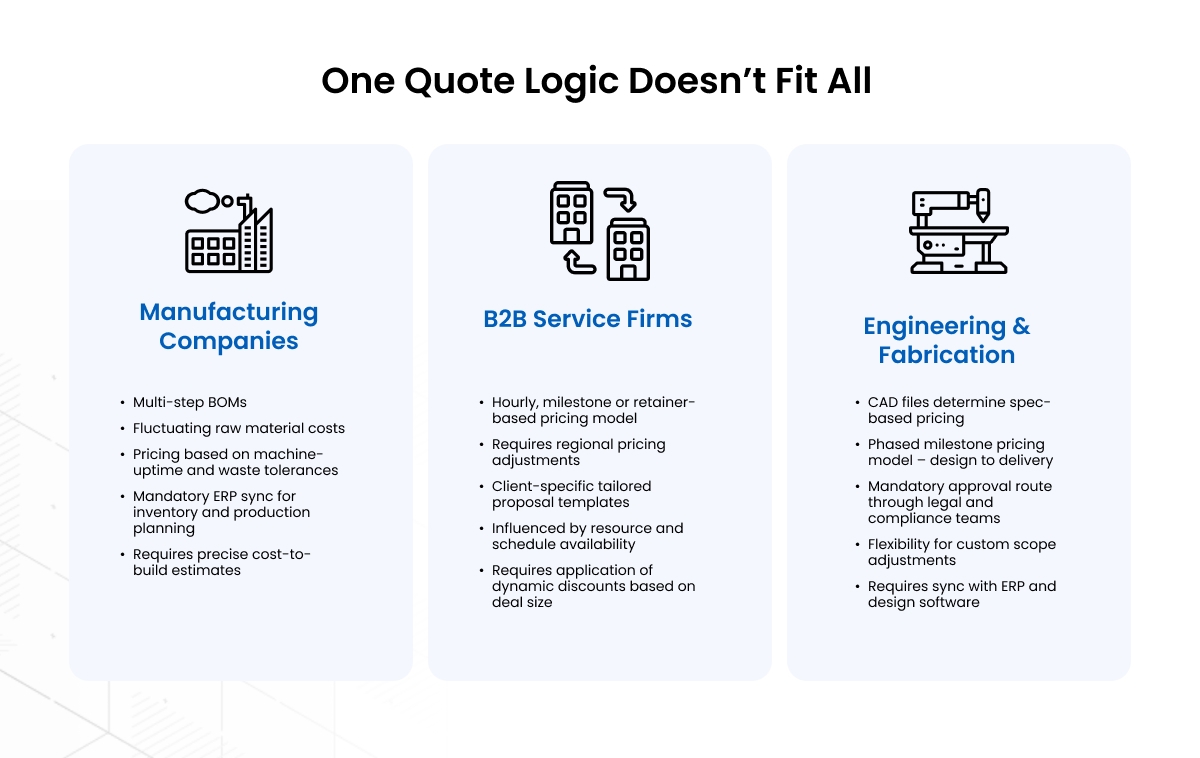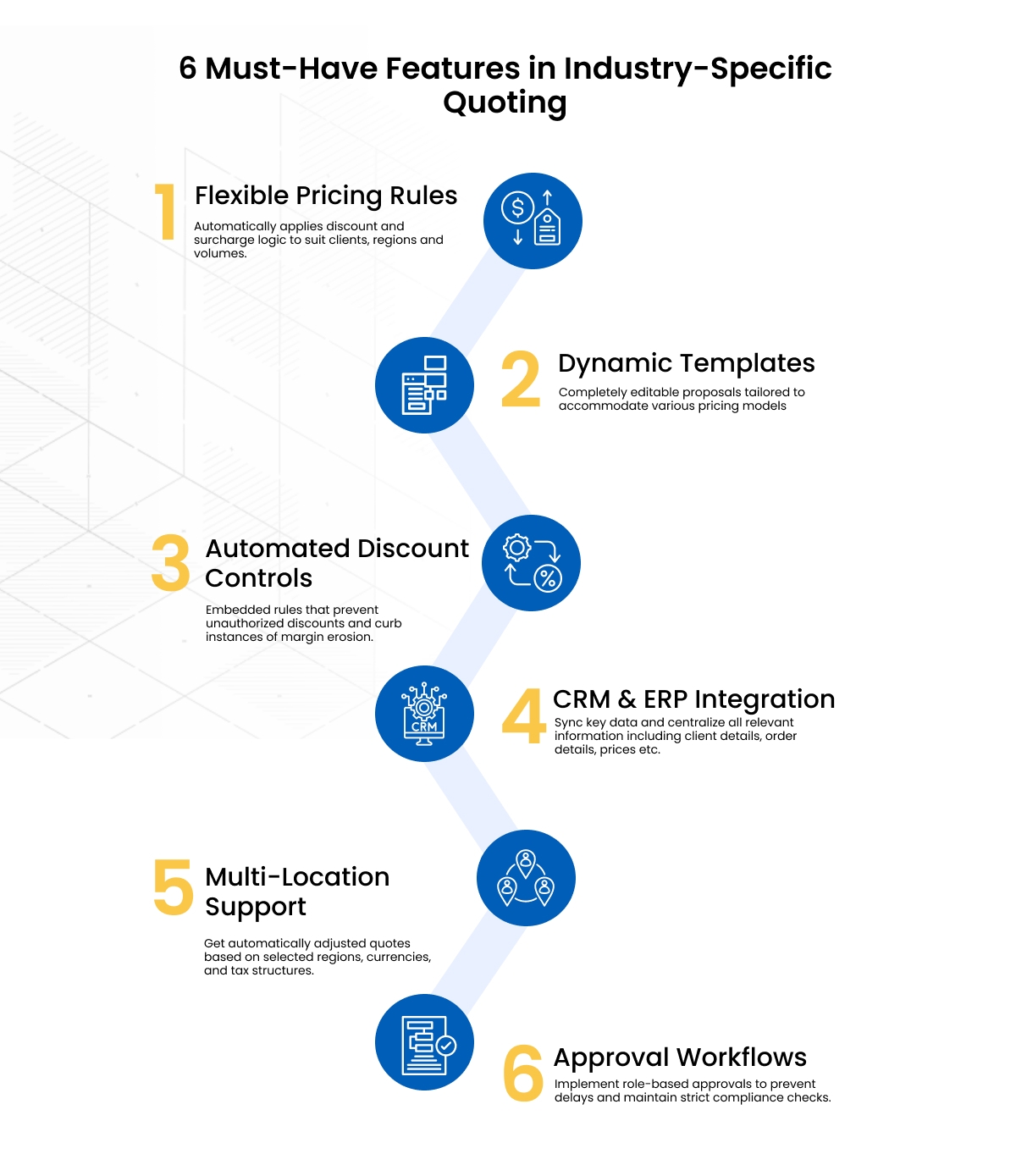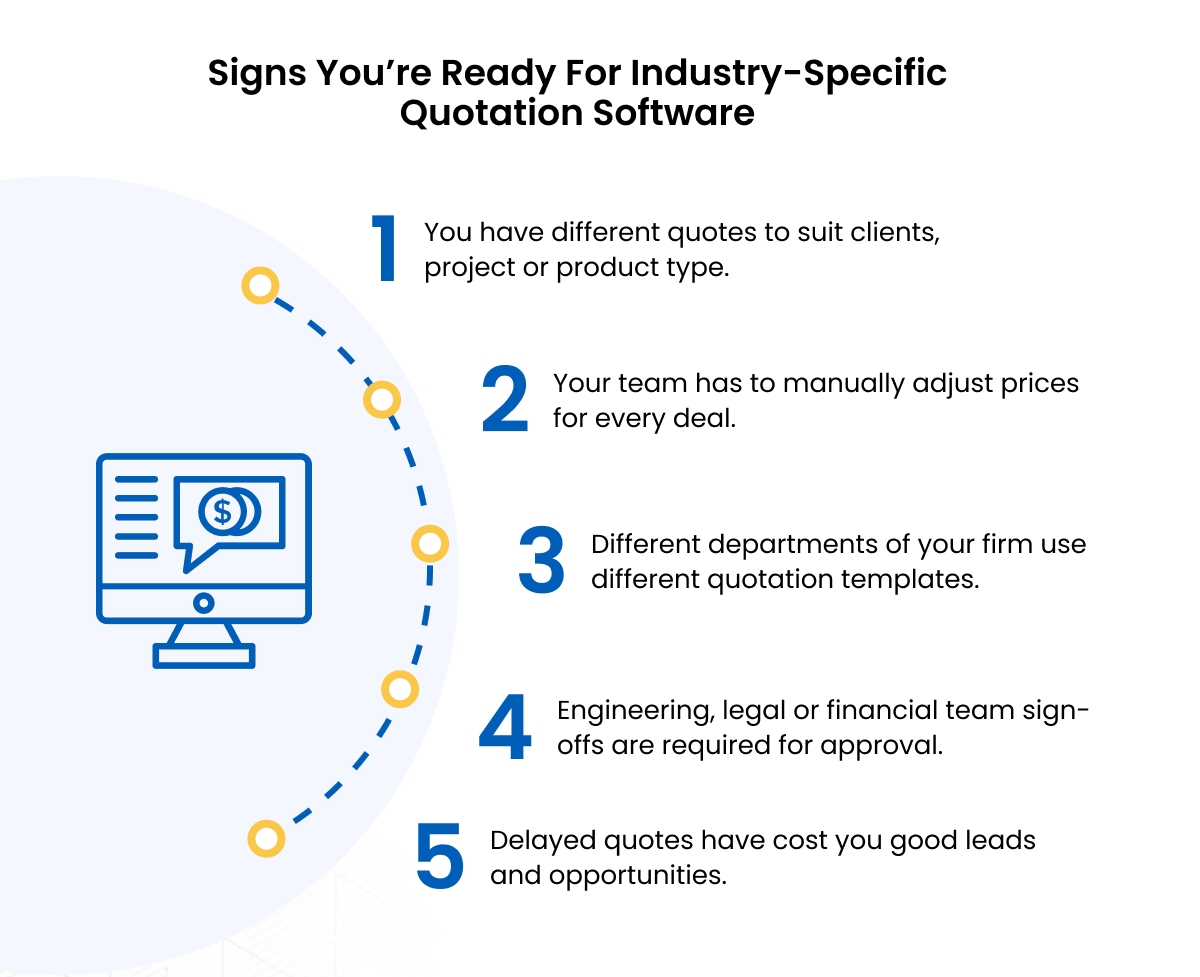The Power Of Industry-Specific Quote Systems: A Breakdown By Use Case

|
From manufacturing to construction, automotives to healthcare – there is not a single industry that does not stand to benefit from a custom quote system. Designed to win where generic tools fail, custom software is like the magical spell that can turn your prospects into lifelong clients – except it works on real logic, and it has the numbers to back it up.
In 2024, the global market size of quoting software stood at a whopping USD 2.89 Billion! The expected growth? USD 6 Billion by the year 2031. Now that is a CAGR of 11.2%, pointing to rapid growth, which in itself is an indicator of companies realizing the impact of high-quality quoting software.
It makes sense because you can only go so far with spreadsheets. Take for example, manufacturers. Their quotes have to factor in varying material prices, which can fluctuate almost daily. Service providers have to account for hourly rates. Similarly, fabricators need to enter CAD files into their system to make accurate estimates. Quoting is a complex affair for all of them, and manual efforts are bound to result in errors.
That’s why getting industry-specific quoting software is so crucial. It erases the limitations of generic tools, and reflects the way your business works. Want to dive deep into its modus operandi? Keep reading and we will show you why tailored solutions matter.
What Is The Meaning Of “Industry-Specific” In Quoting Software?
One thing you should know is that “industry-specific” quoting systems are not generic tools that take the same approach to fix all quotation problems. They are a type of custom software, specifically designed to handle the unique challenges of your business model within the industry it is a part of. The agenda is to ensure you get consistently accurate quotes fast. Here are key traits of this software:
Support for industry-specific pricing models
Whether you are a manufacturer, a fabricator or a B2B service provider, you will get a system that follows your pricing structure down to the smallest detail. For instance, if you are a manufacturer, you can generate multi-step BOMs inclusive of variables such as cost of raw materials, waste factors, and machine-hour rates. Fabricators can generate quotes based on CAD files in real-time, and B2B service provider quotes can juggle hourly rates and retainer models with ease. It’s your system, your way.
Custom logic for materials, labor and scope
Customizability is essential for industry-specific quotation systems. You can embed logic unique to your business into the software so it reflects the real-world variables that directly impact its quotes. That may mean having waste tolerances and production lead times baked into the system for manufacturers. Fabricators may benefit from spec-based calculations or prices that take design flexibility and compliance into account. Whatever your industry maybe, with custom logic you get accurate quotes each time.
Compatibility with existing workflows
Using ERP, CRM or CAD platforms to run your business? You do not have to worry about compatibility issues if you opt for industry-specific custom quoting systems. They are built to pull data from each of the tools in your software suite, thus enabling real-time visibility into your inventory, supplier costs, customer data, and/or technical specifications. This interconnectedness nearly eliminates data silos so your quote-to-order process always works in perfect sync.
Flexibility in user roles and approval paths
While multi-tiered approval workflows are a norm in almost all industries, the hierarchy changes, and that matters. A pharmaceutical company may have a more layered approval procedure than a fabrication company. Custom quoting software takes this nuance into account and fashions company-specific approval routes while also supporting role-based access so there are no bottlenecks but you still have complete control over your quotes.

Applications Of Industry-Specific Quotation Software In Manufacturing & Fabrication
The quoting process, though similar in spirit, can look wildly different from industry to industry, and manufacturing and fabrication are no different. While parts and prices are a crucial aspect of both their proposals, they are only half the story. The other half involves complex calculations of labor, machine runtime, variable material costs, and waste tolerances. Let us explore how quoting software for manufacturing handles all of that.
Variable raw material costs and waste tolerances
A lot of factors can play a role in influencing the day-to-day rates of raw materials. Think market conditions, supplier rates, and bulk order changes, to name a few.
The problem is not fluctuation itself, but how generic tools handle that fluctuation. They are typically incapable of pulling real-time pricing or complex waste factors, which means you end up with quotes that are far from accurate, and can potentially erode your business margins.
The picture changes dramatically if you resort to industry-specific software. Capable of integrating live supplier pricing, it automates the calculation of waste factors based on material type and production method. Thus, no details are skipped and each quote reflects the most current prices.
Multi-step BOMs and machine-hour pricing
Multi-step Bills of Materials are characteristic of manufacturing quotes. That means each component/part in the quote may have its own associated costs, lead times, and production dependencies. Needless to say, such proposals are highly complex, requiring a specialized tool to complete them. A fabrication quote tool can help you create quotes with dynamic BOMs with assembly stage costs, machine run-time rates, and material pricing automatically factored in.
Quote accuracy tied to production planning
Accuracy in a quote is important. But the alignment of that quote with your production capabilities? That is critical. The deep integrations of industry-specific quoting software with your ERP system make this alignment possible. Since the system is able to access key information around production schedules, machine availability, and labor shifts, you get proposals that help you deliver exactly what’s promised.
Application Of Industry-Specific Quotation Software In B2B Service Firms
For B2B services, quotation is a meandering process fraught with all sorts of variable pricing, timelines, staff availability, and client expectations. The kind of flexibility that is necessary to deal with all of these factors is something only service quoting software can provide. Configurable in every sense of the term, it can give your team the agility they need to produce accurate and competitive quotes.
Hourly, project-based or retainer pricing logic
The simultaneous presence of multiple pricing models is one of the most complex layers of B2B service quotes. Generic tools may struggle to handle hourly, project-based or retainer rates, forcing the entire process into a rigid template that leads to messy workarounds. On the other hand, a professional service quoting tool factors in all kinds of pricing logics while maintaining complete accuracy.
Region-based pricing and proposal templates
Service firms that are spread across different locations have to be mindful of currency rules, local tax structures, and labor costs when designing their quotes. Configurable quotation making software automatically adjusts pricing based on region-specific rules. It also offers proposal templates that reflect the local nuances of a particular region.
Dependencies on staffing and scheduling
The availability of key staff members such as engineers, consultants or service teams can play a crucial role in determining the final price in a quote. Quote software for service businesses – especially when custom-made – seamlessly syncs with your company’s internal calendar and staff schedules to generate proposals with realistic timelines.

Application Of Industry-Specific Quotation Software In Engineering & Custom Design Firms
Pricing hours and parts, though integral, are a tip of the iceberg when it comes to quoting in engineering. To build an accurate quote that will prove fruitful for such companies, it is critical to interpret technical specifications and anticipate design assumptions while keeping relevant compliance rules in mind. Industry-specific quotation systems check all of these boxes.
Specs, CAD files, and design assumptions
The initial rounds of engineering and custom design quotes are likely to be built on rough CAD drawings and incomplete blueprints. The specs of the project are likely to evolve too, over time, based on changing client requirements. Tailored quotation software can be connected to CAD tools, allowing estimators to extract the specs of each project so they can craft clear proposals.
Approval chains with legal or compliance teams
From safety certifications to IP clauses and regulatory approvals – quoting in engineering requires compliance checks. This means multi-layered approvals are the standard. While the engineer’s sign-off may come first, proposals will also have to go through legal and finance teams to ensure everything is in order. Custom software mimics your approval trails to maintain transparency and compliance.
Phased pricing across project milestones
Due to the time and effort taken to fulfil an average order, it is difficult to bill engineering projects in one go. That’s why most design firms opt for phased pricing wherein bills are tied to key milestones such as designing, prototyping, manufacturing/assembling, and delivery. That said, milestone logic can be unique to your business and may not follow this exact format. No matter how it looks, you can embed logic unique to your business into custom industry quoting platforms to maintain complete clarity.
Signs You Need Industry-Specific Quoting Software
There may not be a single major sign but there will be a cluster of small situations that indicate you need to think bigger than spreadsheets and generic CPQ tools. For example:
- Your company’s quotes are widely variable: That means using a single template is out of the question. Manual adjustments to suit every client or job will make the whole process cumbersome.
- You have to manually adjust prices for every job: Not only is the manual input of discounts, surcharges, and region-specific pricing a hassle but it can also lead to oversight and inconsistency.
- Your team relies on multiple templates: Whether it’s your sales team, finance team or legal team, if all of them use their own template, inconsistencies are bound to follow.
- Your quotes need multiple rounds of approval: Using email threads to keep track of all mandatory approvals can lead to unnecessary delays.
- Delays and bottlenecks are commonplace: Speedy quote delivery is not just a nice-to-have, it’s necessary. If your quoting process drags, competitors are more likely to swoop in and steal your clients.
If you have mentally checked most, if not all, of these boxes, you can consider your firm ready for industry-specific quotation software. With a tailored tool, you no longer have to suffer the consequences of the limitations above. Instead you can enjoy automated quotes that are consistently accurate.

Why Generic CPQ or SaaS Tools Often Fall Short
We cannot deny that on paper generic CPQ tools can seem like a great choice. Affordable, ready to deploy, and offering basic features, they can seem like the ultimate quick-fix to all your quoting problems. But as is known, “all that glitters is not gold”, and neither is generic software. Here is why:
Rigid templates not built for complex pricing
Generic tools lack the flexibility needed to handle nuanced calculations, whether it’s raw material surcharges or milestone-based billing. Since there is no way to force your industry’s pricing model into the system, your team has no choice but to use awkward workarounds that turn the whole process into a nightmare.
Workarounds become technical debt
Think about it. Patching together a string of spreadsheets and manual formulas can overwork the system and make it tough to manage. These workarounds do not enhance efficiency, they make the process more cluttered and confusing.
Poor fit for multi-layered workflows
For highly regulated industries, standard quoting software does not cut it. Multi-stage project sign-offs, compliance reviews, and engineering approvals barely fit into the system, leading to mistakes, delays, and lost opportunities.
It is no wonder that industry-specific quote systems are gaining momentum. Their growth and rising demand is proof that they actually work.
Final Thoughts – Choose a System That Fits How You Quote
Take our word for it – your quoting process is way too critical to be left in the hands of generic CPQ tools. Whether you are helming a manufacturing firm or running a B2B service company, you need a system that makes sense – one that can overcome your workflow challenges and adapt to your unique pricing models and approval routes.
At Vestra Inet, we build the kind of industry-specific quoting software your company needs. Not only do our systems adapt to our clients’ business models, but they can handle things like phased billing and BOMs while automating the entire quoting process. Contact us if you want software that prioritizes speed and precision so you can win deals faster.
FAQs
1. What is an industry-specific quoting software?
It is a type of software specifically designed to cater to the quoting needs of a particular sector, whether it’s manufacturing, services or engineering. It factors in the industry’s unique compliance requirements and pricing models.
2. How does quoting differ between manufacturing and service industries?
Service quotes involve hourly, retainer-based, and milestone pricing. On the other hand, manufacturing quotes handle BOMs, raw material costs, and machine-runtime pricing. The quoting logic for both is different.
3. Why can’t I use standard CPQ tools for custom workflows?
Using standard CPQ tools for custom workflows is like trying to fit a square peg into a round hole. Rigid in nature, these tools cannot handle CAD files, phased approvals, and regulatory approvals.
4. Can quoting systems integrate with ERP or CAD tools?
Yes, especially the custom kind that can be designed to sync with your ERP, CRM, and CAD systems. This ensures that both project and pricing data are accurate across all your quotes.
5. Which industries benefit most from customized quote systems?
Almost all industries benefit from a customized quote system. But if we have to name a few, we would pick manufacturing, fabrication, engineering, and B2B sectors. These types of industries have complex quoting logic that tailored systems can handle with ease.
Author Bio
Andrey Wool
Helming the operations at Vestra Inet, Andrey has over 20 years of leadership experience in the ERP industry. Having successfully launched 550+ software projects across a diverse set of industries, Andrey continues to transform the way businesses function with pioneering custom software solutions. His in-depth knowledge of sectors such as manufacturing and distribution has helped him curate actionable solutions that eliminate bottlenecks and pave the way for sustainable growth.
